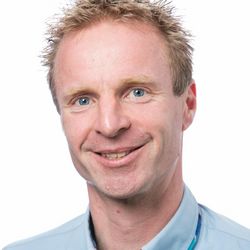The story of Coen Kuiper
I started in high spirits at the agricultural university in Wageningen after finishing my pre-university education. But I quickly realised that my interests didn’t lie with biology and ecology. I have an impulsive nature sometimes, and that’s what made me undertake a total career switch. I trained as a restaurant cook, and then worked as a cook for two years. It’s not an experience I would have wanted to miss. You might wonder how I could then become a hydraulic engineering specialist at Witteveen+Bos and Delft University of Technology (TU Delft). Let me explain that below.
I certainly enjoyed my work as a cook, but the attraction to technology turned out to be stronger. That’s why I decided to end my hospitality adventure and instead start studying Civil Engineering at Saxion University of Applied Sciences in Enschede. I undertook my graduation research at the Rijksinstituut voor Kust en Zee (RIKZ, the national maritime and coastal institute), where I designed solutions for dyke reinforcements in the Western Scheldt using interventions in the foreshore to reduce wave loads. I was inspired hugely by their state-of-the-art knowledge on hydraulic modelling; that motivated me to continue in hydraulic engineering.
Instead of continuing my studies after graduating from college, I chose to work at Deltares (then the hydraulic engineering laboratory) to specialise further. That’s where I continued my specialisation in coastal hydraulic engineering and scale models. Meanwhile I could still use the facilities of the hydraulic laboratory in the Noordoostpolder. That’s really the Mecca for hydraulic engineers, seeing all those scale models there. Some of the old models are still hidden away in the watercourse forest and can be seen again. During my Deltares time I was able to perform scale model tests for a whole range of interesting projects like Palm Island, island group The World, and Delta Flume testing for Maasvlakte 2’s innovative stony dune solution.
I decided to switch to Witteveen+Bos after eight years. So I’m a side-entrant, as it’s so nicely called. Choosing Witteveen+Bos stemmed from the substantive knowledge and commitment of its people, with whom I had been able to work on projects during my Deltares time.
In Witteveen+Bos, I’m often in the role of being an intrinsic specialist in hydraulic design (breakwaters, soil protection, dykes) in projects. The Afsluitdijk project has been one of my biggest projects over the past seven years. My role here was discipline leader in hydraulic engineering, tasked with all the issues and loads involving wave-water levels. It’s really interesting to remain involved in such a diverse project right from the planning study through to its execution. Scale model research also played a major role in this project again; from small-scale flume and basin testing to large-scale 1:3 tests in the Delta Flume, the world’s largest artificial wave facility. My role was to supervise the design and scale model research and to analyse the test results in such a way that the design team could also use them for further optimisation.
The work at Witteveen+Bos is very dynamic; you can find yourself wearing a series of hats in the same day. It might range from working for a government authority to assessing a design in progress for a client, and then you occupy the design chair for a contractor. I also like the fact that I can combine my work at Witteveen+Bos with working one day a week at Delft University of Technology. There I deliver guest lectures and help students to graduate. This lets me continue my own personal development, staying up to speed on the field’s latest developments. The specialist role suits me perfectly. Witteveen+Bos has a range of development programmes for employees. Where one person might keep growing as a project manager, I opted for the specialist role. This role regularly sees me engaged on various expert panels, such as joint research projects with the business community (so-called Joint Industry Projects) or hired as a specialist by a contractor.
So my advice to all young starters is to follow your heart, and think of the role where you would feel most comfortable. Working in a role with which you have complete affinity is what works best for you, while also making you the most productive for your employer. Keep being curious about developments in your field, and continue thinking about improvements in your discipline that can contribute to a more sustainable society!
